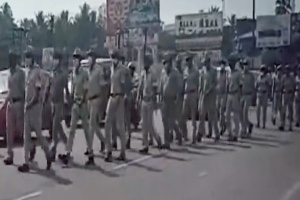
 By Shankar Raj*
By Shankar Raj*
Bengaluru: Ahead of reopening of schools on Monday February 14, 2022, the Karnataka government sent out a tough message that students and groups with an agenda cannot take it for a ride on the spreading pro-hijab and saffron shawl protests by sending in security forces on a flag march in Udupi, Chitradurga and Doddaballapura.
The flag march came soon after tension prevailed in Davanagere after a Hindu man was thrashed by a group of people, believed to be Muslim men, over a social media post. A case has been filed and four people have been arrested.
The schools are to open on Monday – the same day when the Karnataka High Court is scheduled to resume hearing petitions challenging the hijab restrictions. Releasing details of the interim order Friday, the court said no religious attire, whether shawls or hijab, will be allowed inside educational institutions.
Also read:
- Hijab row: Court asks students not to insist on wearing ‘religious things’ till it passes judgment
- बेवजह है हिजाब पर विवाद
- AIBA wants government to prohibit hijab and niqab in “secular” schools
The Supreme Court too rejected an urgent hearing on the hijab row, saying it “will interfere only at an appropriate time.” A student in Karnataka had approached the Supreme Court on the matter. The student in her appeal to the apex court said practical exams will start on February 15 and “any interference on students’ access to educational institutions will impede their education”.
Meanwhile, releasing details of the interim order Friday, the High Court of Karnataka has restrained all students regardless of their religion or faith from wearing saffron shawls (bhagwa), scarfs, hijab, religious flags or the like within classrooms until further orders in the petitions pending consideration on the issue of right to wear hijab in classrooms.
“This order is confined to such of the institutions wherein the College Development Committees have prescribed the student dress code/uniform,” the court clarified.
“Ours being a civilised society, no person in the name of religion, culture or the like can be permitted to do any act that disturbs public peace and tranquility. Endless agitations and closure of educational institutions indefinitely are not happy things to happen,” the three-judge bench headed by Chief Justice Krishna S. Dixit said.
“Firstly, we are pained by the ongoing agitations and closure of educational institutions since the past few days, especially when this court is seized of this matter and important issues of constitutional significance and of personal law are being seriously debated. It hardly needs to be mentioned that ours is a country of plural cultures, religions and languages. Being a secular State, it does not identify itself with any religion as its own,” the bench observed.
“Every citizen has the right to profess and practice any faith of choice, is true. However, such a right not being absolute, is susceptible to reasonable restrictions as provided by the Constitution of India. Whether wearing of hijab in the classroom is a part of essential religious practice of Islam in the light of constitutional guarantees, needs a deeper examination. Several decisions of the apex court and other High Courts are being pressed into service,” the court said.
The protests that began against a hijab ban in one government-run college in Udupi spread to many other institutions where girls wearing hijabs were not allowed entry. As saffron scarf-wearing students launched counter protests, violence at one college forced the police to fire teargas to control the flare-up.
*Shankar Raj is former Editor of The New Indian Express, Karnataka and Kerala, and writes regularly on current affairs.





